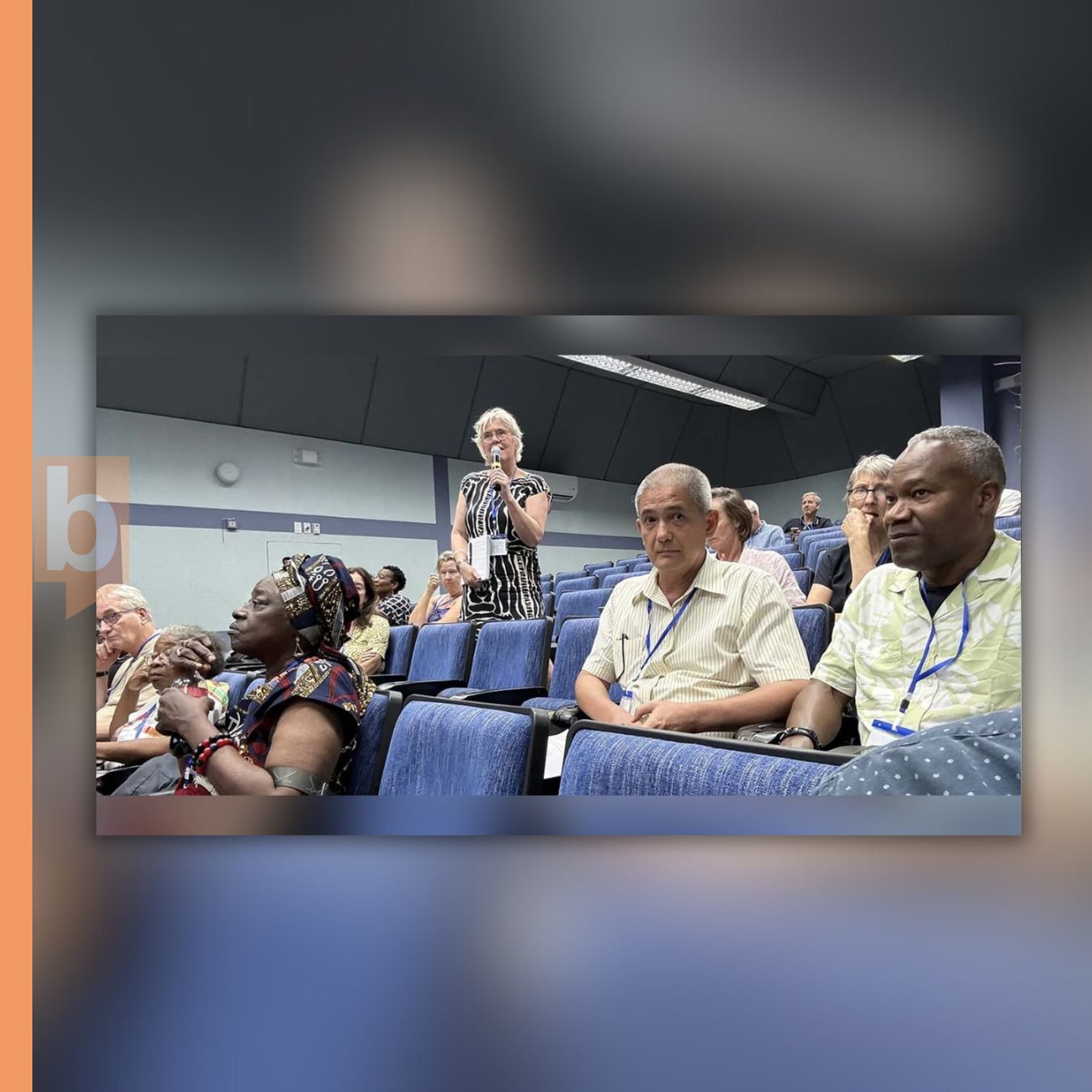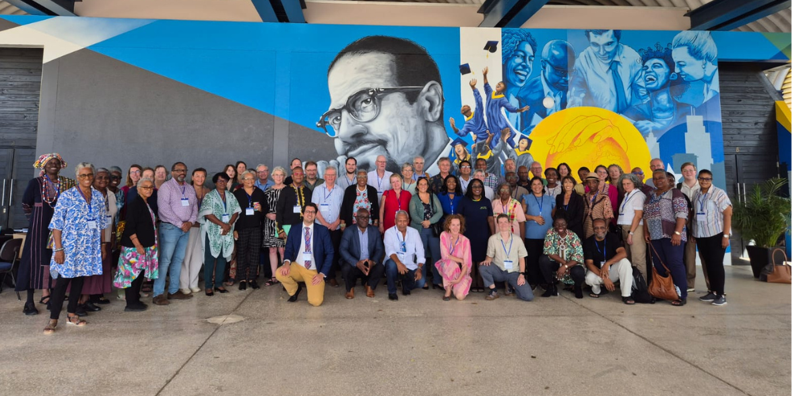
WILLEMSTAD--The debate about church and slavery cannot, should not be confined to the Netherlands. That conviction lay behind the conference on church and slavery in the Netherlands, the Dutch Caribbean and Suriname, which took place in Curaçao from 10 to 14 November. What started as a modest plan quickly grew as interest surged. In the end, the program featured 44 lectures and presentations, with more than one hundred participants taking part.
Initiator and anthropologist Rose Mary Allen stressed how important it is to convene this conversation in the former colonies themselves, described by Alex van Stipriaan as the “scene of the crime” of Dutch slavery. Researchers and church leaders came together from across the former Dutch colonial world. Attendees travelled from the Netherlands, the United States, Brazil, Jamaica, Canada, Suriname and the Dutch Caribbean islands of Aruba, Bonaire, Curaçao, St. Eustatius, St. Maarten and Saba.

The conference combined academic content with cultural and religious expression. Alongside papers and panels, there were dance performances, theatre used as a tool for dialogue, a church service on Wednesday evening and, on Friday, an excursion that explored Curaçao’s religious traditions.
While tourists were snorkeling outside in the bright blue Caribbean Sea, participants inside focused on four broad themes: the role of the Bible and theology in slavery; the role of mission; how church and slavery related to Afro-Surinamese and Afro-Caribbean religions and traditions (Winti, Montamentu, Brua); and the ongoing impact of slavery today, including possible forms of repair.
The lectures showed that the prevailing story about church and slavery needs to be revised in at least three respects. African traditions and sources played a key role in how enslaved people interpreted and reshaped Christianity. The Nederduitse Gereformeerde Kerk can in some respects indeed be viewed as a missionary church. Public debate in the Netherlands also contained more abolitionist voices than is often assumed.
Among the speakers were experienced public figures, including former politicians, former island governors and clergy. Their contributions produced a series of striking statements that invited further thought, such as:
“While the church sought obedience, the people found meaning” (Bob Harms)
“Physical slavery is like the sting of ants, spiritual slavery is like the sting of a scorpion” (Mildred Caprino)
“Were the slaves Christianised or did the slaves Africanise Christianity?” (Armando Lampe)
“We should not only produce, but also restore knowledge” (Stella van Rijn, rector magnificus, University of Curaçao)
“They [churches that belonged to the colonial establishment, ed.] aligned themselves not with the cross, but with the whip” (Wycliffe Smith)
Former Prime Minister and former ECYS Minister Wycliffe Smith was the sole representative from St. Maarten at the international conference.
Only two of the presentations focused on the Dutch Windward Islands. One examined the Anglican/Episcopal Church in Saba, St. Maarten and St. Eustatius. Smith’s lecture, “The Role of the Christian Church in the History of Slavery on the Dutch Windward Islands (1643–1863),” was widely praised for its clarity, depth and use of archival sources. He compared six churches active on St. Eustatius, Saba and St. Maarten, noting that Dutch Reformed, Lutheran, Presbyterian and Anglican congregations largely excluded the enslaved and served the colonial elite, while Methodist and Roman Catholic churches actively evangelized, promoted literacy and created rare spaces of dignity and community. Smith highlighted the irony that the colonial churches have mostly vanished, while Methodist and Catholic congregations remain vibrant and “filled with the descendants of those who were once denied entry,” a line that resonated strongly with participants.
On the final day, attendees visited historic religious sites on Curaçao, including early Dutch Reformed and Roman Catholic churches that still bear traces of the link between faith and slavery. Smith said he is finalizing his research for publication and is in discussion with House of Nehesi Publishers. His forthcoming work is expected to make an important contribution to understanding the complex role of Christianity on the Dutch Windward Islands and ensures that St. Maarten, Saba and St. Eustatius are firmly included in the wider Caribbean narrative of faith, oppression, resilience and redemption.
In the closing session, attention shifted to how these insights could reach a wider public. Work will start on a book that will bring together a selection of the lectures. With funding from NWO, the University of Curaçao is also launching a dialogue project on faith communities, slavery and colonialism. There is hope that church leaders and journalists who attended will carry what they learned back into their own circles. Dutch journalist Arie Kok, for example, has already written an accessible series of blog posts about the conference.

Many participants concluded that the week in Curaçao should be regarded as the beginning rather than the end of the conversation on church and slavery in the Caribbean. The key question now is how to continue and deepen this dialogue. Holding the conference in a former colony clearly added value. It made participation easier for local researchers and church representatives, and being physically present in a place shaped by Dutch colonialism made the weight of that history more tangible.
Perhaps, some suggested, future major gatherings on this topic should not automatically take place in Dutch university cities. A final conference might be held in Paramaribo, Cape Town or Jakarta.
The conference was initiated and chaired by anthropologist Rose Mary Allen, professor at the University of Curaçao and co-project leader of the Church and Slavery research project of the PThU, Vrije Universiteit and the University of Curaçao. She was supported by Donate Philbert-Nieveld, a PhD candidate in the Church and Slavery project based in Curaçao, and postdoctoral researcher Martijn Stoutjesdijk from the Netherlands.
In this research project, the participating universities examine the role of the Protestant Church in the Dutch colonial past. The researchers investigate the theological and exegetical arguments put forward by the Church and academia to either justify or criticise slavery, as well as the Church’s financial, social, and administrative involvement in slavery and the slave trade, whether missionary, pastoral, as slaveholders, investors, or guardians of colonial society. Multiple perspectives are taken into account, including those of enslaved people, formerly enslaved individuals, Indigenous populations, people of mixed heritage, and white colonists. The project also pays close attention to the legacy of slavery in today’s churches and society. This is supported by a large advisory group made up of churches and civil society organisations, working alongside the team of researchers.
Join Our Community Today
Subscribe to our mailing list to be the first to receive
breaking news, updates, and more.





